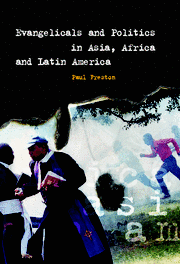Book contents
- Frontmatter
- Contents
- Foreword by David Martin
- Acknowledgements
- List of abbreviations
- Introduction
- PART ONE BRAZIL
- PART TWO ASIA
- PART THREE AFRICA
- 9 Sudan
- 10 Angola
- 11 Mozambique
- 12 Zimbabwe
- 13 Malawi
- 14 Rwanda
- 15 Uganda
- 16 Ghana
- 17 Kenya
- 18 Zambia
- 19 South Africa
- 20 Nigeria
- PART FOUR SPANISH-SPEAKING LATIN AMERICA
- Conclusion
- Bibliography
- Index
- Frontmatter
- Contents
- Foreword by David Martin
- Acknowledgements
- List of abbreviations
- Introduction
- PART ONE BRAZIL
- PART TWO ASIA
- PART THREE AFRICA
- 9 Sudan
- 10 Angola
- 11 Mozambique
- 12 Zimbabwe
- 13 Malawi
- 14 Rwanda
- 15 Uganda
- 16 Ghana
- 17 Kenya
- 18 Zambia
- 19 South Africa
- 20 Nigeria
- PART FOUR SPANISH-SPEAKING LATIN AMERICA
- Conclusion
- Bibliography
- Index
Summary
Sudan is estimated by Baur (1994: 525) to be 4.7 per cent Protestant, while Johnstone (1993) talks of 7 per cent. It is the only part of sub-Saharan Africa where Islam has become state ideology. Its Christians (and their animist kinsmen) have been at war with the government since 1995, with a break between 1972 and 1983. As a result, Sudan has the world's largest population of internally displaced people.
Islam in Sudan, unlike other sub-Saharan countries with Muslim majorities, is associated with Arabism, adding ethnic and cultural components to the religious divide. In the north, Christian kingdoms a thousand years old were overthrown in the sixteenth century, but even the Ottomans could not extend effective control over the south. The Anglo-Egyptian condominium from 1899 endorsed the traditional link between Islam and the state in the north, but in the south it permitted Christian missions. The evangelical Anglican Church Missionary Society (CMS) gained Equator Province and the American Presbyterians gained the east of Upper Nile. John Garang, head of the Sudan People's Liberation Army (SPLA), is a product of Anglican work among the Dinka, and the SPLA makes a point of describing him as ‘a practising good Christian’. At independence in 1956, the south demanded federation, but the government was determined to Arabise and Islamise. The true conflict is Arab versus non-Arab, says Haynes (1996: 101); not exactly so, says O'Fahey (1995: 42).
- Type
- Chapter
- Information
- Evangelicals and Politics in Asia, Africa and Latin America , pp. 115 - 118Publisher: Cambridge University PressPrint publication year: 2001



